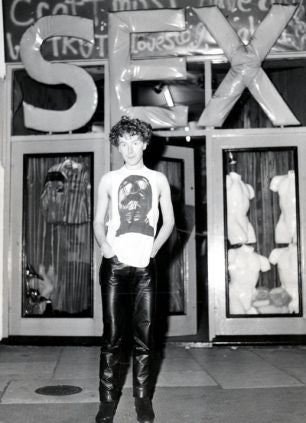 Sex Pistols manager and punk impresario Malcolm McLaren died Thursday morning in New York. He was 64.
Sex Pistols manager and punk impresario Malcolm McLaren died Thursday morning in New York. He was 64.
McLaren had been battling cancer for some time, but took a sudden turn for the worse, according to his spokesman. He is expected to be buried in London’s Highgate Cemetery.
McLaren was born in 1946 in North London to young war deserter Pete McLaren, who left home when Malcolm was 2, and Emmy Isaacs. After his father left, Malcolm was raised by his grandmother in Stoke Newington. His mother remarried Martin Levi, who worked in the rag trade.
McLaren, who didn’t get along with his stepfather, left home in his teens, attending and being expelled from several art colleges.
In 1971, he and Vivienne Westwood opened clothes shop Let It Rock on the King’s Road. T he successful boutique sold primarily Teddy Boy-style clothes.
he successful boutique sold primarily Teddy Boy-style clothes.
However, growing disillusioned with his patrons, McLaren first renamed the shop Too Fast To Live Too Young To Die, after meeting the New York Dolls in 1972 and creating stage costumes for them, and later SEX (selling S&M clothing).
Joseph Corre, the son of McLaren and Westwood, founded lingerie brand Agent Provocateur.
By 1975 McLaren had started to manage a band called The Strand.
According to Rolling Stone: “One of the regulars at Sex was a kid named John Lydon, who was distinguished on three counts: 1) his face had the pallor of death; 2) he went around spitting on poseurs he passed on the street; and 3) he was the first to understand the democratic implications of punk — rather than pay 10 pounds for an ugly T-shirt with holes in it, he took a Pink Floyd T-shirt, scratched holes in the eyes and wrote I HATE over the logo. McLaren stood him in front of the jukebox, had him mouth Alice Cooper’s ‘I’m Eighteen’ and declared him their new lead singer. Jones noticed the mung on Lydon’s never-brushed teeth, and christened him Johnny Rotten.”
The punk rock outfit achieved its greatest notoriety in May 1977 with the release of album "God Save the Queen" during the week of Queen Elizabeth II’s Silver Jubilee celebrations.
McLaren garnered intense publicity — achieving his goal — by organizing a boat trip down the Thames in for the Sex Pistols to perform outside the Houses of Parliament. However, the police sunk that operation, and McLaren was arrested.
Music journalist Jon Savage, who wrote a history of the Sex Pistols and punk rock, said, "Without Malcolm McLaren there would not have been any British punk. He’s one of the rare individuals who had a huge impact on the cultural and social life of this nation.
"What he did with fashion and music was extraordinary. He was a revolutionary," Savage said.
The Sex Pistols and McLaren went through an acrimonious split, documented in dueling films "The Great Rock ‘n’ Roll Swindle" and "The Filth and the Fury." Members of the band, notably John Lydon, accused McLaren of mismanaging the band and refusing to pay them. Lydon eventually took McLaren to court, winning complete control of the band in 1987.
McLaren later managed ’80s punk-influenced pop successes including Adam Ant, Bow Wow Wow and Boy George.
McLaren embarked on a solo career, meeting with mixed success. His 1983 album "Duck Rock" scored two Top 10 hits in the U.K., "Buffalo Gals" and "Double Dutch," and was cited as being a significant influence in bringing hip-hop to a wider audience in the U.K. McLaren’s “About Her,” a remix of the Zombies’ “She’s Not There,” was featured in Quentin Tarantino’s "Kill Bill: Vol. 2."
He also is listed as a producer on Richard Linklater’s feature "Fast Food Nation" (2006).
More recently, he toyed with the notion of running for the then newly created London mayoralty in 2000, on a platform that included serving alcohol in libraries.
In 2007, he pulled out of an appearance on British reality show "I’m a Celebrity … Get Me Out of Here," after changing his mind. Lydon had previously taken part in the ITV series. However, McLaren flew to Australia, where it was filming, dismissed the show as "fake" and promptly flew home again.